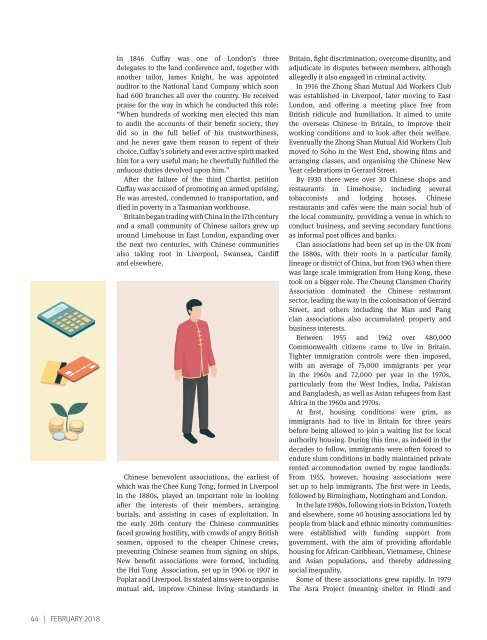FEBRUARY 2018
The February 2018 edition of Co-op News: connecting, challenging and championing the global co-operative movement. This issue looks at the challenges facing workers and co-ops in the context of the future of work. We also interview the International Co-operative Alliance's Ariel Guarco, look at the history of community business and get ready for Fairtrade Fortnight...
The February 2018 edition of Co-op News: connecting, challenging and championing the global co-operative movement. This issue looks at the challenges facing workers and co-ops in the context of the future of work. We also interview the International Co-operative Alliance's Ariel Guarco, look at the history of community business and get ready for Fairtrade Fortnight...
Create successful ePaper yourself
Turn your PDF publications into a flip-book with our unique Google optimized e-Paper software.
In 1846 Cuffay was one of London’s three<br />
delegates to the land conference and, together with<br />
another tailor, James Knight, he was appointed<br />
auditor to the National Land Company which soon<br />
had 600 branches all over the country. He received<br />
praise for the way in which he conducted this role:<br />
“When hundreds of working men elected this man<br />
to audit the accounts of their benefit society, they<br />
did so in the full belief of his trustworthiness,<br />
and he never gave them reason to repent of their<br />
choice. Cuffay’s sobriety and ever active spirit marked<br />
him for a very useful man; he cheerfully fulfilled the<br />
arduous duties devolved upon him.”<br />
After the failure of the third Chartist petition<br />
Cuffay was accused of promoting an armed uprising,<br />
He was arrested, condemned to transportation, and<br />
died in poverty in a Tasmanian workhouse.<br />
Britain began trading with China in the 17th century<br />
and a small community of Chinese sailors grew up<br />
around Limehouse in East London, expanding over<br />
the next two centuries, with Chinese communities<br />
also taking root in Liverpool, Swansea, Cardiff<br />
and elsewhere.<br />
Chinese benevolent associations, the earliest of<br />
which was the Chee Kung Tong, formed in Liverpool<br />
in the 1880s, played an important role in looking<br />
after the interests of their members, arranging<br />
burials, and assisting in cases of exploitation. In<br />
the early 20th century the Chinese communities<br />
faced growing hostility, with crowds of angry British<br />
seamen, opposed to the cheaper Chinese crews,<br />
preventing Chinese seamen from signing on ships.<br />
New benefit associations were formed, including<br />
the Hui Tong Association, set up in 1906 or 1907 in<br />
Poplar and Liverpool. Its stated aims were to organise<br />
mutual aid, improve Chinese living standards in<br />
Britain, fight discrimination, overcome disunity, and<br />
adjudicate in disputes between members, although<br />
allegedly it also engaged in criminal activity.<br />
In 1916 the Zhong Shan Mutual Aid Workers Club<br />
was established in Liverpool, later moving to East<br />
London, and offering a meeting place free from<br />
British ridicule and humiliation. It aimed to unite<br />
the overseas Chinese in Britain, to improve their<br />
working conditions and to look after their welfare.<br />
Eventually the Zhong Shan Mutual Aid Workers Club<br />
moved to Soho in the West End, showing films and<br />
arranging classes, and organising the Chinese New<br />
Year celebrations in Gerrard Street.<br />
By 1930 there were over 30 Chinese shops and<br />
restaurants in Limehouse, including several<br />
tobacconists and lodging houses. Chinese<br />
restaurants and cafés were the main social hub of<br />
the local community, providing a venue in which to<br />
conduct business, and serving secondary functions<br />
as informal post offices and banks.<br />
Clan associations had been set up in the UK from<br />
the 1880s, with their roots in a particular family<br />
lineage or district of China, but from 1963 when there<br />
was large scale immigration from Hong Kong, these<br />
took on a bigger role. The Cheung Clansmen Charity<br />
Association dominated the Chinese restaurant<br />
sector, leading the way in the colonisation of Gerrard<br />
Street, and others including the Man and Pang<br />
clan associations also accumulated property and<br />
business interests.<br />
Between 1955 and 1962 over 480,000<br />
Commonwealth citizens came to live in Britain.<br />
Tighter immigration controls were then imposed,<br />
with an average of 75,000 immigrants per year<br />
in the 1960s and 72,000 per year in the 1970s,<br />
particularly from the West Indies, India, Pakistan<br />
and Bangladesh, as well as Asian refugees from East<br />
Africa in the 1960s and 1970s.<br />
At first, housing conditions were grim, as<br />
immigrants had to live in Britain for three years<br />
before being allowed to join a waiting list for local<br />
authority housing. During this time, as indeed in the<br />
decades to follow, immigrants were often forced to<br />
endure slum conditions in badly maintained private<br />
rented accommodation owned by rogue landlords.<br />
From 1955, however, housing associations were<br />
set up to help immigrants. The first were in Leeds,<br />
followed by Birmingham, Nottingham and London.<br />
In the late 1980s, following riots in Brixton, Toxteth<br />
and elsewhere, some 40 housing associations led by<br />
people from black and ethnic minority communities<br />
were established with funding support from<br />
government, with the aim of providing affordable<br />
housing for African-Caribbean, Vietnamese, Chinese<br />
and Asian populations, and thereby addressing<br />
social inequality.<br />
Some of these associations grew rapidly. In 1979<br />
The Asra Project (meaning shelter in Hindi and<br />
44 | <strong>FEBRUARY</strong> <strong>2018</strong>


















